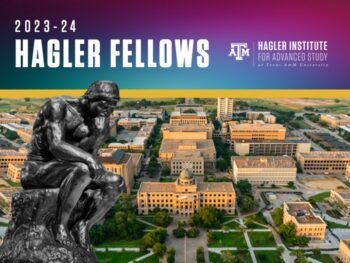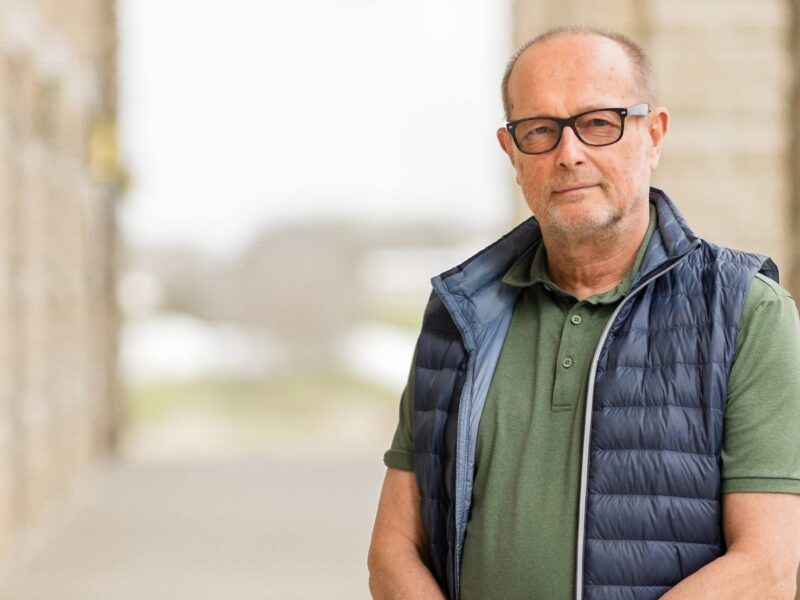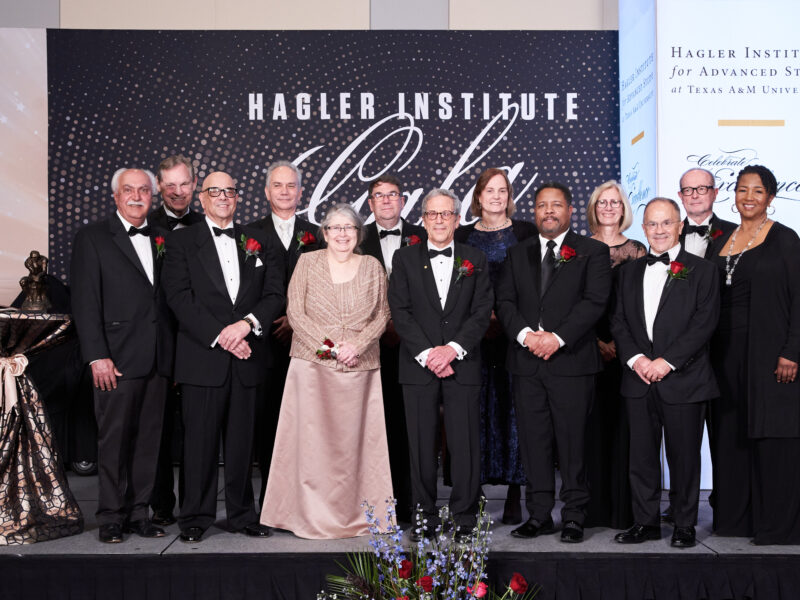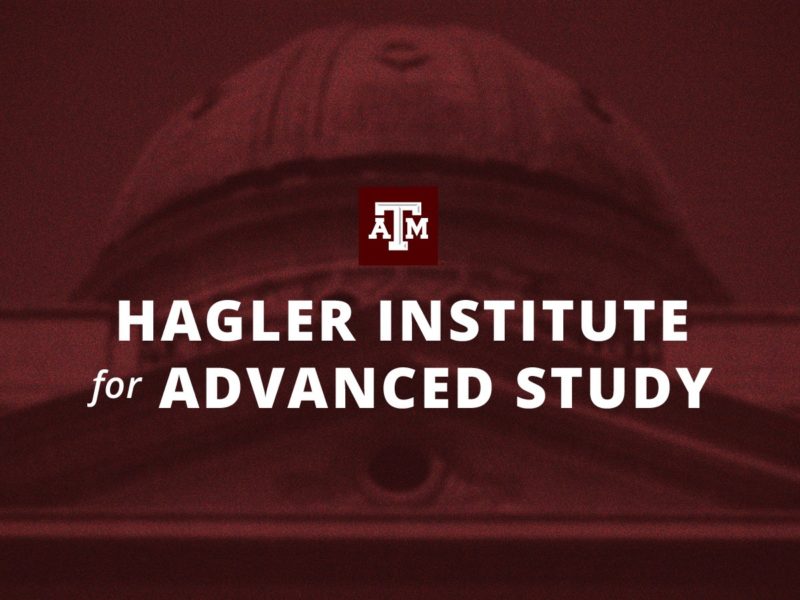Hagler Institute Reveals Newest Class Of Fellows And Lecturers

A Nobel physicist, a Nobel economist and the first female astronaut of color to travel into space are among 14 new Hagler Fellows and two new Distinguished Lecturers announced today by the Hagler Institute for Advanced Study at Texas A&M University.
The Class of 2023-24 is the Hagler Institute’s largest in its 13-year history. Each fellow or lecturer belongs to the National Academies of Sciences, Engineering and Medicine, or holds recognitions of equal stature in their field. The newest class includes scientists, engineers and scholars who are recognized internationally for their achievements and scholarship.
Since 2012, the Hagler Institute has attracted 126 world-class researchers to the Texas A&M campus: 116 Hagler Fellows and 10 Distinguished Lecturers. Of these, 15 have joined Texas A&M’s faculty.
“Once again, the Hagler Institute has attracted an exceptional class of fellows and lecturers to work with our already exceptional community of Texas A&M researchers,” Texas A&M University System Chancellor John Sharp said. “Working in tandem with the Chancellor’s Research Initiative and the Governor’s University Research Initiative, the institute likely will persuade some of these National Academy-level researchers to join our outstanding, permanent faculty.”
The fellows will collaborate with faculty, researchers and students in the colleges of Agriculture and Life Sciences, Arts and Sciences, and Engineering; schools of Education and Human Development, Engineering Medicine, Medicine, Public Health, and Veterinary Medicine and Biomedical Sciences; and at Texas A&M University at Galveston.
“Since 2012, the Hagler Institute has linked Texas A&M’s faculty and students with some of the world’s most influential scholars,” said Gen. (Ret.) Mark A. Welsh III, interim president. “The 12th class of Hagler Fellows is top-notch, and I look forward to the invaluable mentorship opportunities and educational experiences our faculty and students alike will benefit from as a result of this outstanding program.”
The institute selects its Hagler Fellows from among top scholars who have distinguished themselves through outstanding professional accomplishments and significant recognition.
Previous classes of Hagler Fellows have included four Nobel laureates, a Wolf Prize recipient, a recipient of the Hubble Medal in Literature for Lifetime Achievement, a recipient of the National Medal of Science, an awardee of the National Medal of Technology and Innovation, a two-time recipient of the State Prize of Russia and a recipient of both the National Humanities Medal and the Johan Skytte Prize, the most prestigious award in political science.
“We have great expectations for this new class of Hagler Fellows,” Founding Director John L. Junkins said. “We believe they will have a productive and enduring impact on our faculty, our students and on the culture of the Texas A&M campus.”
The Hagler Institute will induct the Class of 2023-24 during its annual gala in March. The 14 new fellows are:
- Philip Calder, head, School of Human Development and Health, University of Southampton — Calder is known for his work in understanding how nutrition affects human body function and the development of strategies to lower disease risk. He is a fellow of the Royal Society for Biology, the Association for Nutrition and the Higher Education Academy. Calder will collaborate with faculty, researchers and students in the School of Medicine.
- Alicia Carriquiry, Distinguished Professor and holder of the President’s Chair in Statistics, Iowa State University — Carriquiry focuses her work on applications of statistics in human nutrition, bioinformatics, forensic sciences and traffic safety. She is a member of the National Academy of Medicine and a fellow of the American Association for the Advancement of Science. Carriquiry will collaborate with faculty, researchers and students in the College of Arts and Sciences.
- George Georgiou, Dula D. Cockrell Centennial Chair in Engineering #2, The University of Texas at Austin — Georgiou is a leader in the development of protein therapeutics. He is a member of the National Academy of Medicine and the National Academy of Engineering as well as a fellow of the American Association for the Advancement of Science. Georgiou will collaborate with faculty, researchers and students in the School of Medicine.
- Jody Gookin, FluoroScience Distinguished Professor of Veterinary Scholars Research Education, North Carolina State University — Gookin is an expert in gastroenterology and discovered the most common cause of colitis in domestic cats. She is affiliated with the American Society of Microbiology, the American Physiological Society and the American Gastroenterology Society. Gookin will collaborate with faculty, researchers and students in the School of Veterinary Medicine and Biomedical Sciences.
- Mae Jemison, president, The Jemison Group — Jemison was the first female astronaut of color to travel into space and is the current principal of the 100 Year Starship Project, a space exploration initiative funded by the Defense Advanced Research Projects Agency. She is a member of the National Academy of Medicine and the American Chemical Society as well as a fellow of the American Association for the Advancement of Science. Jemison will collaborate with researchers, students and faculty in the School of Engineering Medicine.
- Eric Maskin, Adams University Professor, Harvard University — Maskin is known for his contributions to game theory, contract theory, social-choice theory and political economy. He is a recipient of the Nobel Memorial Prize in Economics, a member of the National Academy of Sciences and a fellow of the American Academy of Arts and Sciences. Maskin will collaborate with faculty, researchers and students in the College of Arts and Sciences.
- H. Richard “Rich” Milner IV, professor and holder of the Cornelius Vanderbilt Chair of Education, Vanderbilt University — Milner critically examines racial justice and equity to support educator effectiveness across all disciplines. He is a member of the National Academy of Education and a fellow of the American Educational Research Association and the National Education Policy Center. Milner will collaborate with faculty, researchers and students in the School of Education and Human Development.
- Kyle Myers, independent consultant and former director, Division of Imaging, Diagnostics, and Software Reliability, Food and Drug Administration — Myers has developed next-generation screening techniques for medical diagnostics using advanced imaging technology for breast cancer, Alzheimer’s and Parkinson’s disease. She is a member of the National Academy of Engineering and a fellow of the Society for Photo-optical Instrumentation Engineering. Myers will collaborate with faculty, researchers and students in the College of Engineering.
- Sir Konstantin Novoselov, Tan Chin Tuan Centennial Professor, National University of Singapore — Novoselov is an expert in condensed matter physics. In 2004, he and physicist Andre Geim shared the Nobel Prize for Physics for mapping the properties of graphene. He is a member of the National Academy of Sciences and a fellow of the Royal Society in the United Kingdom. Novoselov will collaborate with faculty and students in the College of Arts and Sciences.
- Eleftherios “Terry” Papoutsakis, Unidel Eugene DuPont Chair Professor, University of Delaware — Papoutsakis is a pioneer in metabolic engineering and has discovered ways to manipulate complex cellular processes. He is a member of the National Academy of Engineering, the American Society for Microbiology and the American Chemical Society. Papoutsakis will collaborate with faculty, researchers and students in the College of Engineering.
- Radia Perlman, fellow, Dell EMC — Perlman’s contributions to network design, including the function of link-state routing protocols, have earned her the nickname “Mother of the Internet.” She is a member of the National Academy of Engineering, the Internet Hall of Fame and the National Inventors Hall of Fame. Perlman will collaborate with researchers, students and faculty in the College of Engineering.
- Soroosh Sorooshian, Distinguished Professor, University of California, Irvine — Sorooshian has advanced water resource systems through the development of remote sensing and precipitation runoff modeling. He is a member of the National Academy of Engineering and the International Academy of Astronautics. Sorooshian will collaborate with faculty, researchers and students in the College of Arts and Sciences.
- Robyn Tanguay, Distinguished Professor, Oregon State University — Tanguay explores how to predict the damage that chemicals, nanomaterials and similar structures may inflict upon vertebrate development. She is a recipient of the James and Mildred Oldfield and E.R. Jackman Foundation Team Award at Oregon State University and the Reproductive and Developmental Toxicology Scientific Achievement Award from the Society of Toxicology. Tanguay will collaborate with faculty, researchers and students at Texas A&M University at Galveston.
- Günter Wagner, Allison Richard Professor Emeritus, Yale University — Wagner examines the developmental basis of homology and complex evolutionary adaptive systems. He is a member of the National Academy of Sciences and the American Academy of Arts and Sciences as well as a fellow of the American Association for the Advancement of Science. Wagner will collaborate with faculty, researchers and students in the College of Agriculture and Life Sciences and the School of Veterinary Medicine and Biomedical Sciences.
In addition, the institute announced two Hagler Distinguished Lecturers for 2023-24:
- Julio Ottino, Walter P. Murphy Professor, Northwestern University — Ottino is known for inventing whole-brain engineering, which coordinates the analytical left side of the brain with the creative right side to develop new engineers. He is a member of the National Academy of Sciences, the National Academy of Engineering and the American Academy of Arts and Sciences. Ottino will collaborate with faculty, researchers and students in the College of Engineering.
- Mark Zoback, Benjamin M. Page Professor, Stanford University — Zoback investigates how various gases and natural processes may trigger earthquakes. He is a fellow of the American Geophysical Union and the American Association for the Advancement of Science as well as a member of the National Academy of Engineering. Zoback will collaborate with faculty, researchers and students in the College of Engineering.
About the Hagler Institute for Advanced Study: The Hagler Institute for Advanced Study was established in December 2010 by The Texas A&M University System Board of Regents to build on the growing academic reputation of Texas A&M and to provide a framework to attract top scholars from throughout the nation and abroad for appointments of up to a year. The selection of Hagler Fellows initiates with faculty nominations of National Academies and Nobel Prize-caliber scholars who align with existing strengths and ambitions of the university.
Media contact: Amanda Scott, (979) 458.4989, arscott@tamu.edu





